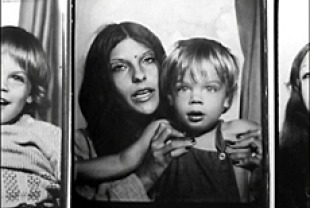At age 11 Jonathan Caouette started using a camera to document his life and to create an alternate universe to the one in his Texas home. His mother, Renee, was a child model who was briefly paralyzed after a fall off a roof. Her parents, concerned about her mental state, agreed to have her receive electroshock treatment for two years. This only made things worse, and Renee was in and out of many mental institutions. She married at 19, but her husband left her. One time in Chicago, Jonathan witnessed her being raped.
Jonathan, a homosexual, began to play different characters, including an abused woman, in front of the video camera. With such an unstable family life, he was sent to live in various foster homes and suffered what the doctors called depersonalization disorder. Eventually, this frustrated youth was turned over to his grandparents. In various segments featuring them, they appear to be quite eccentric and not very understanding of his traumas or his creativity.
As the writer, director, and editor of Tarnation, Jonathan Caouette has fashioned a record of his painful childhood out of a hodgepodge of Super-8 movies, video diaries, early short films, pictures from photo albums, answering machine tapes, pieces from songs, and other pop culture elements. This unusual documentary also contains scenes from New York City where he found a place to live with his boyfriend David. When Jonathan receives a phone call informing him that his mother has been hospitalized for lithium toxicity, he drops everything to be with her. She returns to New York with him and they experience an edgy and awkward encounter with his birth father.
There are times in this documentary when Caouette crosses the line and purposely tries to shock and stun viewers. But the overall work achieves something very strong and powerful that has been noted in Wayne Muller's book Legacy of the Heart: The Spiritual Advantages of a Painful Childhood: "It requires a tremendous leap of faith to imagine that your childhood — punctuated with pain, loss and hurt — may, in fact be a gift. Certainly the unhappiness you felt, was not, in itself, a blessing; but in response to that pain, you learned to cultivate a powerful intuition, a heightened sensitivity, and a passionate devotion to healing and love that burns deep within you — and these are gifts that may be recognized, honored and cultivated." As Tarnation demonstrates, Caouette has been a good steward of his pain and created something that may prove to be transformative for others who are on the same path of suffering and loss.
Screened at the 42nd New York Film Festival October 2004.
